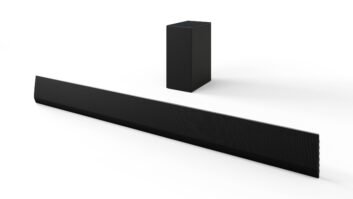Earth Day—held annually on April 22—is an annual event designed to demonstrate support for environmental protection, and 2020 marks the 50th anniversary of the very first Earth Day.
To mark 50 years of action for our planet, Earth Day Network, the global coordinator of Earth Day, will bring Earth Day back to its roots building an intergenerational movement demanding change.
“Our world needs a united response for bold action,” said Kathleen Rogers, president of Earth Day Network. “The true value of Earth Day in 2020 will be demonstrated in the long-term global outcomes of new environmental policy, community resilience, and a healthier future for our planet.”
We asked pro AV manufacturers what steps their company is taking to reduce its carbon footprint—here’s what they had to say.
Karen Smidt, Director of Product Marketing, Legrand

As a corporation, Legrand is committed to an absolute reduction of carbon, and is a signatory to the science-based targets initiative—an international commitment to lower our emissions in line with the Paris Agreement. Within the AV business specifically we’ve upgraded facilities to be more energy efficient, reduce water consumption, and provide programs for employees such as composting, electric vehicle charging stations, and battery recycling. We’ve also focused heavily on waste reduction and landfill diversion.
Here’s a few examples of how these initiatives have played out for the AV business:
- The Legrand AV headquarters in Eden Prairie, MN was renovated to LEED-CI Silver status, utilizing natural light for 95 percent of regularly occupied seats and reducing water usage by 30 percent.
- Renovation of our Warsaw, IN facility led to a 15 percent reduction in annual water consumption and 835,500 KWH annual energy savings. Warsaw is also a 100 percent landfill diversion facility.
- Our Minnetonka, MN facility recently accomplished 99.3 percent landfill diversion and is continuing to investigate new ways to increase that number.
- The Da-Lite brand has many GreenGuard Gold certified products and operates the Screen Green Program, which encourages customers to send in their Da-Lite vinyl screen surfaces to be recycled into materials such as traffic cones, floor mats, and landscape edging.
- The Fairfield, NJ facility is located on a rehabilitated brownfield site that achieved GreenCircle Certification by diverting 96 percent of non-hazardous waste from landfills.
Pablo Espinosa, Vice President and Chief Loudspeaker Designer, Meyer Sound

Green business has been a priority for Meyer Sound from the start. Founders John and Helen Meyer came of age in the 1960’s at the start of the U.S. environmental movement and the ideas they embraced in their youth informed the vision for the company they founded in 1979.
Driven by our own belief that “green business is good business,” informed by the ethical policies of our customers, and dedicated to meeting the diverse standards required by our global marketplace, Meyer Sound began a serious company-wide focus on “green initiatives” more than a decade ago. Promoting sustainability throughout our industry, reducing our own energy consumption by 15 percent, and achieving zero waste are the visionary goals of a nearly completed five-year sustainability action plan.
The entire Meyer Sound family is actively involved in our sustainability plan, with employees, volunteering regularly with cleanup program in parks and wetlands in the San Francisco Bay Area. More and more are driving electric vehicles and taking public transportation to work.
Read more about Meyer Sound’s green initiatives here: avnetwork.com/news/meyer-sound-targets-peak-energy-efficiency-and-zero-waste-at-its-recycled-berkeley-campus.
Maile Keone, President, Listen Technologies

Listen Technologies is built on a set of values that motivates and drives how we conduct business. We believe it is our fundamental responsibility to be socially and environmentally responsible. Some of the ways we are minimizing our global footprint include repurposing or recycling shipping boxes and encouraging recycling with bins near every printer and document shredder. We also use environmentally-friendly shipping materials such as bamboo packaging and pulp trays made from 100-percent recycled paper.
Before the pandemic, we offered work-from-home options to support employees who chose to work remotely; this helped reduce carbon output associated with commuting to work. We also offered a fully stocked kitchen on campus so employees could easily prepare meals or warm food brought from home and eliminate the need to commute during lunchtime.
Nancy Knowlton, CEO, Nureva

As energy consumers, we have done several things that reduce our carbon footprint: we moved to an energy-efficient building in a downtown location to enable staff to use public transportation; we use motion sensors manage lights and meeting room systems; we choose to connect with prospects via UC&C, offering online webinars and demos; and our building offers a full recycling program.
Regarding the products that we develop, our tools support remote work and collaboration, helping our customers reduce their carbon footprints. Specifically, for our hardware, we use recyclable packaging, we employ localized supply chains and we have optimized power requirements in both operating and standby modes to minimize consumption.
Pamela Lothman, Senior Manager, Corporate Governance & Compliance, Christie

Christie is committed to being a globally responsible business, and that includes incorporating sustainability into our practices and managing our environmental impact to help conserve energy and resources.
Operational improvements such as heat recycling, where we reuse heat from our manufacturing process to heat other areas of our plant, are ongoing. To date, our environmental activities have helped to reduce our natural gas consumption by over 40 percent while reducing our water use by 25 percent. Recycling in our primary manufacturing facility achieves an average 82 percent recycle rate which includes an innovative foam recycling program. Building and HVAC improvements to Christie facilities have resulted in reduced GHG emissions.
Christie’s new Environmental Action Plan focuses on reducing CO2 emissions on target products, such as laser projectors and initiatives toward reducing emissions from upstream and downstream Scope 3 sources by 2030
Bose
We aspire to infuse sustainability into our day-to-day work across the company, so that it shapes our thinking and the way we do business.
In 2018, a 1.7 MW solar array went online at our Framingham, MA headquarters. The system brings enough electricity onto the grid to power a substantial portion of our Framingham campus, which helps Massachusetts meet its renewable energy goals.
Our 2019 Sustainability Report shares our most impactful sustainability activities over the past two years. To view the report, click here.
This article originally ran on avnetwork.com.













